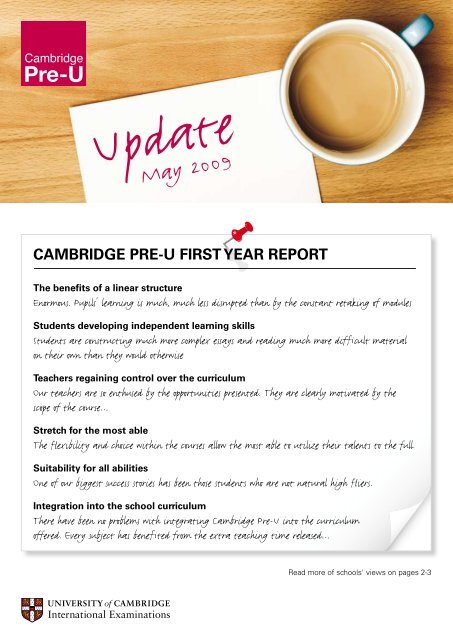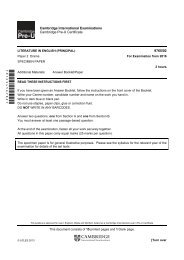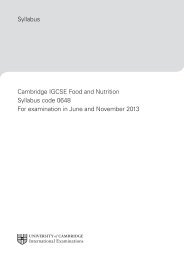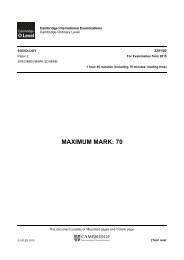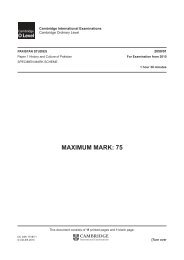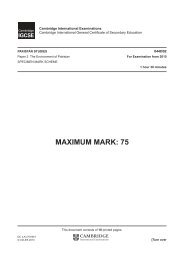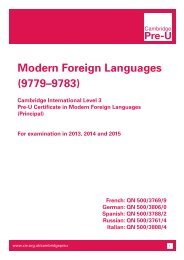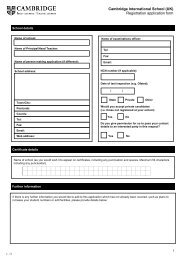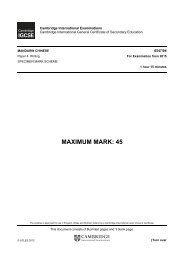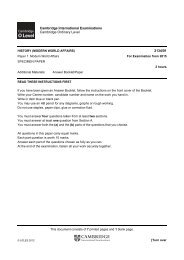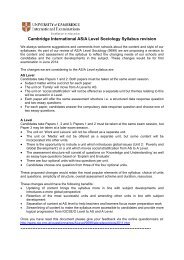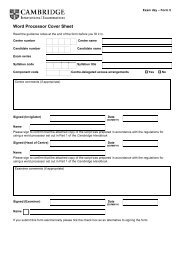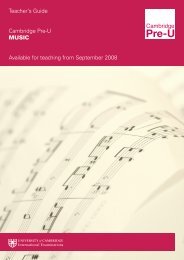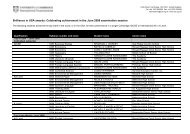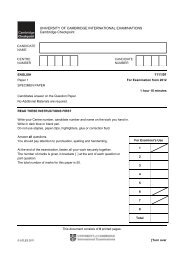Cambridge Pre-U First Year rePort - Cambridge International ...
Cambridge Pre-U First Year rePort - Cambridge International ...
Cambridge Pre-U First Year rePort - Cambridge International ...
You also want an ePaper? Increase the reach of your titles
YUMPU automatically turns print PDFs into web optimized ePapers that Google loves.
<strong>Cambridge</strong> <strong>Pre</strong>-U <strong>First</strong> <strong>Year</strong> <strong>rePort</strong><br />
the benefits of a linear structure<br />
Enormous. Pupils' learning is much, much less disrupted than by the constant retaking of modules<br />
students developing independent learning skills<br />
Students are constructing much more complex essays and reading much more difficult material<br />
on their own than they would otherwise<br />
teachers regaining control over the curriculum<br />
Our teachers are so enthused by the opportunities presented. They are clearly motivated by the<br />
scope of the course…<br />
stretch for the most able<br />
The flexibility and choice within the courses allow the most able to utilize their talents to the full.<br />
suitability for all abilities<br />
One of our biggest success stories has been those students who are not natural high fliers.<br />
integration into the school curriculum<br />
There have been no problems with integrating <strong>Cambridge</strong> <strong>Pre</strong>-U into the curriculum<br />
offered. Every subject has benefited from the extra teaching time released…<br />
Read more of schools' views on pages 2-3
excellent reports from <strong>Cambridge</strong> <strong>Pre</strong>-U schools<br />
We invited three <strong>Cambridge</strong><br />
<strong>Pre</strong>-U schools, Walthamstow Hall,<br />
Sevenoaks, Winchester College<br />
and Leweston School, to give us<br />
their assessment of the first year of<br />
teaching. Here's what they told us:<br />
benefits of a linear structure<br />
‘Enormous… Pupils’ learning is much,<br />
much less disrupted than by the<br />
constant taking of modules. There is a<br />
much greater sense of development<br />
over the course of the two years, two<br />
years which, in terms of academic<br />
maturity, are absolutely critical.<br />
We hope to have begun to develop<br />
students who can see the larger vistas<br />
of learning which university studies<br />
will require.’<br />
‘Benefits of the linear structure have<br />
been very clear with all our candidates<br />
– weaker ones have had time to grow<br />
and develop without undue pressure –<br />
and stronger ones have had more time<br />
for reading around the text, and wider<br />
reading in general.’<br />
‘Our students have welcomed the<br />
opportunity to study a course in depth,<br />
without worrying about the next exam<br />
coming up. They are enjoying making<br />
connections between topics and have<br />
clearly demonstrated an increasing<br />
maturity in their analysis skills and<br />
essay writing.’<br />
‘The whole department was keen<br />
to teach a linear course in the Sixth<br />
2 CAMBRIDGE PRE-U UPDATE maY 2009<br />
Form, as we feel that it produces<br />
better mathematicians. It enables<br />
girls to gain a deeper understanding<br />
of the subject as a whole and make<br />
links between different areas of the<br />
syllabus.<br />
Students really mature over the<br />
course of the Sixth Form and concepts<br />
that were challenging in the Lower<br />
Sixth often seem less daunting in the<br />
Upper Sixth. Having the time to let<br />
more demanding concepts settle and<br />
become more familiar is very helpful.’<br />
‘We have covered a great deal more<br />
history this year than we would be<br />
able to do at AS, and the knowledge<br />
that exams are at the end of two<br />
years has allowed girls the opportunity<br />
to develop skills gradually in the<br />
knowledge that things will not get any<br />
harder than they currently are.’<br />
developing independent learning<br />
skills<br />
‘The [GPR] course improves<br />
independent study skills by allowing<br />
students to think in a more crosscurricular<br />
fashion. The girls see links<br />
between subjects now that would<br />
otherwise have passed them by.’<br />
There is every opportunity for this.<br />
The scope of the specifications is<br />
sufficiently broad that pupils needs<br />
must become independent learners to<br />
do full service to all eras of study. The<br />
various forms of personal investigation<br />
reinforce this process.<br />
regaining control over the<br />
curriculum<br />
‘Our teachers are so enthused by the<br />
opportunities presented. They are<br />
clearly motivated by the scope of the<br />
course, and the flexibility to choose<br />
topics of interest and which suit their<br />
expertise. The teachers are regularly<br />
seen carrying out their own research<br />
to develop their range of resources.’<br />
‘We have been able to plan the course<br />
for the ‘Overview of English Literature’<br />
and for the unseen paper (25% of<br />
the assessment). Very satisfying and<br />
enjoyable.’<br />
‘I wouldn’t be able to teach my British<br />
course (1760 – 1846) as it stands
under any of the conventional AS<br />
syllabuses, and therefore I really<br />
appreciate the freedom to pick out the<br />
bits of history that interest me and my<br />
colleagues.’<br />
‘It’s very liberating for teachers,<br />
the two years and the scope of the<br />
syllabuses have given teachers back<br />
an opportunity to shape students’<br />
learning to suit their strengths and<br />
weaknesses. Options are generous<br />
but allow a coherent programme of<br />
study to be created.’<br />
stretch for the most able<br />
‘The flexibility and choice within<br />
the courses allow the most able to<br />
utilise their talents to the full. They<br />
have found that they are not limited<br />
by restricted short answer exam<br />
questions. Above all, they have been<br />
stimulated to think.’<br />
‘The whole [GPR] course extends<br />
gifted students – in a sense the sky<br />
really is the limit… Our students are<br />
genuinely looking forward to and<br />
are really excited by the prospect of<br />
being able to undertake an in-depth<br />
study next year, and see it as more<br />
of an undergraduate year than an A2<br />
equivalent year.’<br />
suitability for all abilities<br />
‘One of our big success stories has<br />
been those students who are not<br />
natural high fliers. They have enjoyed<br />
being able to study a subject and<br />
grow into it without worrying about an<br />
imminent exam.’<br />
‘Weaker candidates have had the<br />
time to develop reading stamina and<br />
explore larger texts, eg Xxxxx has<br />
become passionate about Hardy’s The<br />
Woodlanders (read independently)<br />
– which she will be able to use for<br />
her independent study. A year ago at<br />
GCSE she would have baulked at the<br />
idea!’<br />
Although the <strong>Cambridge</strong> <strong>Pre</strong>-U<br />
specifications are undoubtedly<br />
challenging enough for the very<br />
ablest, they have proved accessible<br />
to a broader spectrum of students<br />
than may commonly be imagined...<br />
having two years to cultivate skills<br />
and understanding, and the released<br />
extra teaching time available more<br />
than compensates for the challenge<br />
of making the leap from <strong>Year</strong> 11 work.<br />
Students have the bonus of knowing<br />
that the standard of work required<br />
will not get harder in <strong>Year</strong> 13 and they<br />
appreciate this.<br />
integration into the school<br />
curriculum<br />
‘All but one of the subjects which<br />
we take in the Sixth Form, for which<br />
there is a <strong>Pre</strong>-U exam has opted for<br />
<strong>Cambridge</strong> <strong>Pre</strong>-U. Integrating the<br />
remaining AS/A2 has been more of a<br />
problem!’<br />
‘There have been no problems with<br />
integrating <strong>Cambridge</strong> <strong>Pre</strong>-U into the<br />
curriculum offered. Every subject has<br />
benefited from the extra teaching time<br />
released by not having AS modules<br />
in January of the Lower Sixth <strong>Year</strong>…<br />
[Students] clearly feel an increased<br />
sense of achievement and I am sure it<br />
is significant that next year, <strong>Cambridge</strong><br />
<strong>Pre</strong>-U subjects are amongst the<br />
most popular. The ‘student voice’ has<br />
spoken!’<br />
Would you like to write a report card<br />
on <strong>Cambridge</strong> <strong>Pre</strong>-U?<br />
Email it to seymour.g@cie.org.uk<br />
or share it with the <strong>Cambridge</strong> <strong>Pre</strong>-U<br />
online community.<br />
CAMBRIDGE PRE-U UPDATE maY 2009 3
support for interim assessment<br />
Teachers appreciate the fact that<br />
they do not have to prepare their<br />
<strong>Cambridge</strong> <strong>Pre</strong>-U Principal Subjects<br />
students for examinations this month,<br />
but they have expressed a need for a<br />
checkpoint of progress at the midpoint<br />
of the first year of teaching <strong>Cambridge</strong><br />
<strong>Pre</strong>-U.<br />
Because <strong>Cambridge</strong> <strong>Pre</strong>-U is in<br />
its first year of teaching, CIE has<br />
provided interim assessment material<br />
to inform teaching and learning in the<br />
second year. This will also support<br />
HE applications as universities have<br />
indicated that in the absence of<br />
a certified AS grade, they will be<br />
looking for a predicted grade and the<br />
applicant’s place in the school’s rank<br />
order for each subject.<br />
interim assessment material<br />
Interim assessment material is<br />
now available for teachers currently<br />
teaching <strong>Cambridge</strong> <strong>Pre</strong>-U Principal<br />
Subjects. Although different<br />
arrangements have been made on a<br />
subject-by-subject basis, generally the<br />
assessment materials include PDF<br />
files of interim assessment question<br />
papers and Word documents of both<br />
the mark schemes and question<br />
papers. We have provided the interim<br />
assessments in this format to enable<br />
centres to customise question papers<br />
according to course content covered<br />
to date.<br />
Feedback for teachers<br />
A feedback service is available for<br />
those teaching <strong>Cambridge</strong> <strong>Pre</strong>-U.<br />
Schools are invited to send in<br />
candidates’ answers to whole papers<br />
or individual items included in the<br />
assessment material provided this<br />
term. Teachers will mark and annotate<br />
the scripts and give the rank order.<br />
CIE Examiners will then respond<br />
with reports on the application of the<br />
mark scheme and general patterns of<br />
performance.<br />
It is not possible to assign<br />
<strong>Cambridge</strong> <strong>Pre</strong>-U grades for these<br />
assessments, as grades can only be<br />
awarded on the basis of evidence<br />
across the whole assessment.<br />
However, Examiners will identify<br />
features that exemplify the kinds of<br />
performance they will be looking for<br />
in awarding marks for Pass, Merit and<br />
Distinction.<br />
Reports will be specific to<br />
individual schools, with an overall<br />
summary published after all the<br />
schools have submitted their<br />
candidates’ work.<br />
iNset<br />
Subject-specific <strong>Cambridge</strong> <strong>Pre</strong>-U<br />
INSET was held in May. The INSET<br />
focused on assessment and standard<br />
setting. This helps teachers set and<br />
mark papers and apply the <strong>Cambridge</strong><br />
<strong>Pre</strong>-U standard. Marked exemplars<br />
were available and there were<br />
opportunities for teachers to discuss<br />
mark schemes, using live scripts.<br />
The next INSET, Getting Started,<br />
will be available in the Autumn term.<br />
It is specifically designed for those<br />
who have started teaching <strong>Cambridge</strong><br />
<strong>Pre</strong>-U subjects, and for those thinking<br />
of starting in September 2010. For<br />
further details of the Autumn INSET,<br />
please contact Linda Oubridge at<br />
oubridge.l@cie.org.uk<br />
CAMBRIDGE PRE-U UPDATE maY 2009 4
support for university applications<br />
CIE is providing ongoing support<br />
for university applications. We<br />
are holding a one-day seminar for<br />
schools on university applications at<br />
St Catharine's College, <strong>Cambridge</strong>,<br />
on 30 June. The seminar will provide<br />
members of staff who are responsible<br />
for advising on university applications<br />
with an opportunity for discussion<br />
with university admissions tutors.<br />
<strong>Cambridge</strong> <strong>Pre</strong>-U students are<br />
expected to apply for places at a wide<br />
range of universities and faculties.<br />
CIE Consultant, Christine Cayley, will<br />
collect detailed information about<br />
their applications from schools in<br />
the autumn and send additional<br />
information on <strong>Cambridge</strong> <strong>Pre</strong>-U,<br />
including relevant syllabuses and<br />
specimen papers to the admissions<br />
tutors at faculty level. She will support<br />
the applications in terms of dealing<br />
with queries and liaising with the<br />
universities.<br />
Christine is also tracking the<br />
progress of the first cohort of students<br />
taking <strong>Cambridge</strong> <strong>Pre</strong>-U. She will<br />
contact schools in the autumn to<br />
gather historical data on where their<br />
typical cohorts have gone on to<br />
higher education, as well as compiling<br />
information about current applications.<br />
A PowerPoint presentation by Dr<br />
Kevin Stannard is available on the<br />
University of <strong>Cambridge</strong> website<br />
at www.cam.ac.uk/admissions/<br />
undergraduate/teachers<br />
international recognition<br />
CIE is also working with universities in<br />
5 CAMBRIDGE PRE-U UPDATE maY 2009<br />
the US to promote the recognition and<br />
acceptance of <strong>Cambridge</strong> <strong>Pre</strong>-U. After<br />
the UK, the US is the most popular<br />
destination for UK school-leavers who<br />
want to go to university. Recently, CIE<br />
formed a Higher Education Advisory<br />
Council to advise on progression into<br />
Higher Education for students with<br />
<strong>Cambridge</strong> qualifications. The group<br />
comprises representatives from<br />
prestigious US universities including<br />
Duke, Notre Dame and Yale. Duke<br />
and Yale universities have already<br />
published admission policies on<br />
<strong>Cambridge</strong> <strong>Pre</strong>-U (see below).<br />
We have also appointed additional<br />
Regional Representative based in the<br />
US to work on university recognition<br />
of <strong>Cambridge</strong> <strong>Pre</strong>-U - Kris Palfrey joins<br />
our US representative Sherry Reach,<br />
and Recognition Consultants Bill Kolb<br />
and Paula Johnson.<br />
Briefing meetings have been<br />
held for Admissions Officers at the<br />
AACRAO conferences in Orlando and<br />
Chicago. More than 2000 participants<br />
from admissions offices at US<br />
universities attend the conferences.<br />
Kevin Stannard, Val Sismey,<br />
Qualifications Development Manager,<br />
and US team members have given<br />
briefings at Harvard, Yale, MIT, Brown,<br />
Columbia, Rice, Northwestern and<br />
Chicago Universities, which were<br />
also attended by participants from<br />
Princeton, Cornell, Boston, New York,<br />
Stony Brook, and Amherst. Further<br />
briefing meetings are planned by<br />
Val and the US team at conferences<br />
for international admissions staff<br />
in Georgia in June and California in<br />
July as well as a series of briefing<br />
meetings across the US.<br />
A full list of US universities can<br />
be found at http://recognition.cie.<br />
org.uk by searching on US, Higher<br />
Education and <strong>Cambridge</strong> <strong>Pre</strong>-U.<br />
Yale University would be pleased<br />
to consider applications from<br />
students with <strong>Cambridge</strong> <strong>Pre</strong>-U<br />
examination results according<br />
to their merits, as is the case<br />
with A Level applicants. All<br />
candidates must submit complete<br />
applications to be considered<br />
for admission to Yale. Yale is in<br />
the process of reviewing what<br />
academic credit might be awarded<br />
for particular <strong>Pre</strong>-U grades.<br />
duke University accepts<br />
<strong>Cambridge</strong> <strong>Pre</strong>-U for entry to<br />
Undergraduate courses.<br />
In order to qualify for and<br />
receive Duke <strong>International</strong><br />
Placement Credit (IPC), students<br />
must present with grades of A or<br />
B (or the equivalent). Accordingly,<br />
a student presenting with grades<br />
of M3 or higher (M2, M1, D3, D2,<br />
or D1) in acceptable subjects in<br />
the <strong>Cambridge</strong> <strong>Pre</strong>-U program<br />
would be eligible to receive IPA<br />
credit, up to our defined limit of 2<br />
such IPC credits.
Learn more!<br />
CIE invites schools to learn more<br />
about <strong>Cambridge</strong> <strong>Pre</strong>-U at a free halfday<br />
seminar at the end of June.<br />
The Learn More! seminars are<br />
aimed at Principals, Deputy Heads and<br />
Curriculum Developers. They provide<br />
an introduction to the qualification<br />
and the opportunity to have questions<br />
answered by CIE. Delegates will also<br />
be updated on the progress of schools<br />
that began teaching <strong>Cambridge</strong> <strong>Pre</strong>-U<br />
in 2008.<br />
The interactive seminars cover key<br />
questions about <strong>Cambridge</strong> <strong>Pre</strong>-U,<br />
including:<br />
• QCA accreditation<br />
• University recognition<br />
• Funding<br />
• Models of adoption<br />
You will also learn more about:<br />
• the resources available to teachers<br />
• the innovative <strong>Cambridge</strong> <strong>Pre</strong>-U<br />
online community – a forum where<br />
teachers can share knowledge and<br />
expertise.<br />
manchester, 23 June<br />
London, 25 June<br />
York, september (tbc)<br />
London, 28 september<br />
To reserve a place for yourself or a<br />
colleague, please contact the CIE<br />
Events Team. This is a free event.<br />
Email: cieeventsteam@cie.org.uk<br />
Tel: 01223 553554<br />
Fax: 01223 553558<br />
6 CAMBRIDGE PRE-U UPDATE maY 2009<br />
Worldwide demand for<br />
<strong>Cambridge</strong> <strong>Pre</strong>-U<br />
Many <strong>Cambridge</strong> schools from around the world have taken a keen interest in<br />
the development of <strong>Cambridge</strong> <strong>Pre</strong>-U in the UK. They have found the structure<br />
and values of <strong>Cambridge</strong> <strong>Pre</strong>-U very appealing and are particularly interested in<br />
<strong>Cambridge</strong> <strong>Pre</strong>-U GPR – because it is designed to be fully compatible with UK<br />
and <strong>International</strong> A Levels.<br />
At the beginning of May, delegates from 15 schools attended a seminar<br />
in <strong>Cambridge</strong> to discuss an international pilot of the GPR component of<br />
<strong>Cambridge</strong> <strong>Pre</strong>-U. During the pilot, schools will work with <strong>Cambridge</strong> to<br />
explore the accessibility of <strong>Cambridge</strong> <strong>Pre</strong>-U GPR for teachers and students<br />
worldwide.<br />
Michael Shelton, English Teacher at Eau Gallie High School, US, was<br />
enthusiastic about the aims of <strong>Cambridge</strong> <strong>Pre</strong>-U GPR. He said: ‘It allows for<br />
the creation of an independent learner rather than a dependent learner.’<br />
After the seminar, Philip Hornblow, Specialist Classroom Teacher at<br />
MacLeans College, New Zealand, said: ’<strong>Cambridge</strong> <strong>Pre</strong>-U GPR is rigorous, it’s<br />
academic, it’s challenging and stimulating.’<br />
New developments in<br />
<strong>Cambridge</strong> <strong>Pre</strong>-U mathematics<br />
Mathematics and Further Mathematics are popular <strong>Cambridge</strong> <strong>Pre</strong>-U Principal<br />
Subjects and we continue to develop our mathematics provision.<br />
<strong>Cambridge</strong> <strong>Pre</strong>-U Mathematics students develop a deep knowledge of<br />
their subject by the end of the two-year course, but, as one teacher put<br />
it: ‘Mathematics at this level gets very hard, very quickly – some students<br />
progress happily to a stage where they seem to hit a wall – and struggle to go<br />
any further.’<br />
Teachers have told us of their concerns that this may be putting students<br />
off post-16 Mathematics completely, so we are developing a Short Course in<br />
Mathematics, that will take one year to complete. Consultation with schools<br />
on this project is ongoing – we welcome your views. Please contact CIE<br />
at international@cie.org.uk if you would like to take part in the consultation<br />
process.<br />
Ultimately we hope that an appealing <strong>Cambridge</strong> <strong>Pre</strong>-U Mathematics Short<br />
Course will make mathematics accessible to greater numbers of students.


